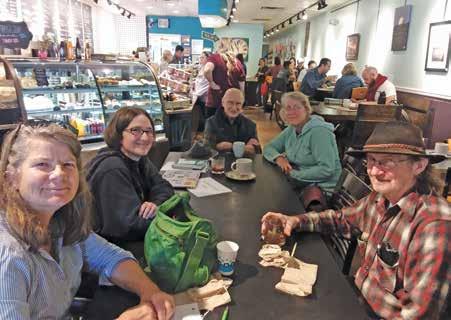
3 minute read
Poetry in the pandemic Writing to connect and heal during trying times
By Abigail Blonigen
In times of crisis, human beings often turn to art. Whether it be music, novels or television, this sharing of stories and experiences helps people feel more connected, even while social distancing.

Poetry in particular forces the reader to pause to focus on the words, their rhythm and meaning.
“Poetry can help quiet the mind and give people a little respite, a little time for reflection,” writer and poet Sheila Packa said.
Packa served as Duluth’s poet laureate from 2012 to 2014 and has published several books of poetry. She takes great joy in teaching writing courses and facilitating writing workshops. As poet laureate, Packa facilitated 40 workshops across the region at women’s shelters, family justice centers, the Northeast Regional Corrections Center, schools, and girls’ groups.
Writing can provide solace and healing during times of crisis and change. In fact, the American Psychological Association reported that writing can reduce stress and strengthen the immune system. Studies have shown that writing can even help wounds heal more quickly.
“If you use your voice and share that with other people, it really does help people get through changes,” Packa said.
Change and migration is a recurring theme in Packa’s poetry, and much has changed for her since the start of the pandemic. While she is grateful for the extra time at her writing desk, she — like many others — is missing her social connections and old routines.
“For 100 years, we haven’t had a pandemic in this country and now we do,” Packa said. “All of a sudden it’s changed everything. It’s changed what people are writing and how they’re writing.”
Because writing can be a rather solitary activity, even in the preCOVID-19 world, there are a number of formal and informal groups in the area to help writers connect and share ideas.
One of these organizations is Lake Superior Writers, whose goal is “to support writers in their artistic development, provide opportunities for them to share their work, learn, improve their skills, and foster a sense of community among writers who live in our region,” according to board chair Leslie Mehle.
Lake Superior Writers is a volunteerled nonprofit with over 200 members. Their flagship event is their annual writing contest, and they hold various events throughout the year such as classes, poetry readings and panels.
Though initially worried about moving their programming online due to the pandemic, Lake Superior Writers has found that folks are still eager to participate in their events.

“I think people really miss the connection,” Mehle said. “We’ve really worked hard to find a way to keep connected with our members and the rest of the writing community.”
“Writer” is a broad term for Lake Superior Writers, as their membership is open to anyone who likes to write, whether they are published authors or simply keep a journal.


“It’s all legitimate,” Mehle said. “It all matters. We’re just here to meet people where they are and provide opportunities that will keep them improving and find their voice.”
In terms of creative process, Packa draws much of her inspiration from time spent outside; images from her walks or hikes will stick in her mind and urge her to find deeper meaning.
“Invariably, I will find some visual, object or image that stays with me, and I usually start by writing about that. I describe it and see where it goes. I try to develop it into a metaphor,” she said.
Lake Superior Writers works to cultivate the literary community in the region. Since the start of the pandemic, they have moved their events online.
Packa describes poetry as a “language inside the language” focused on recreating an experience for the reader. They should see the treetops, feel the wind on their cheeks, hear the rush of the river.
Conveying this experience makes the metaphor more powerful and the meaning of the poem more profound, cementing an intangible idea in pen and ink.
“Whatever you write about makes it stronger,” Packa said. “If you write about justice, if you write about the environment, it makes it stronger. It brings it into the conversation. It makes people aware.”
Though writing can seem intimidating, the great poet Mary Oliver viewed the process of poetry as no different than the process of living a life: “Pay attention. / Be astonished. / Tell about it.”
More information on Lake Superior Writers and their upcoming events can be found at lakesuperiorwriters.org. To learn more about Sheila Packa’s work, go to sheilapacka.com.








